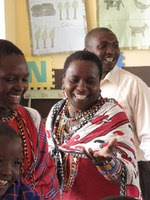Helen's Village

The landscape of the Masai Mara is surely what the Disney artists responsible for Lion King were trying to capture. We came at the right time--Masai Mara is located on the Serengeti Plain, which hosts the largest mammal migrations in the world and is one of the ten wonders of the world. We've been staying on the Masai Mara since Sunday night when we arrived from Brackenhurst and each day on our way to Hellen Nkuraiya's Village of Protection we’ve seen sights we’ll never see in South Central PA.
Not long after hitting the road yesterday, we saw a pride of lion and spotted a cub proudly dragging the hide of a Thomson gazelle (hoof still attached), the kill from which each animal in the pride had obviously eaten. A few kilometers later Cyndi (our best spotter) saw three elephants in the distance. John, our driver, got us within several yards as they crossed the road in front of us. Right in front of the van, the largest among them turned and showed us a full view of his spectacular face. I’m not a great one at judging space, but his head alone--ears extended and trunk sweeping the ground in front—seemed to me the size of a small house. I couldn’t help asking John if we were safe. Moments later we were almost a part of a herd of water buffalo. They are enormous animals, too. Not far up the road a giraffe was taking his morning’s “relief”—we figured his bladder must be the size of a water tank. Each day we see warthogs everywhere (I’m partial to them), wildebeests in the thousands as they migrate (love them, too), zebras (Nancy’s favorite), guinea birds (one of Carole’s favorites), vultures (I hear they taste like chicken) and antelope. Carole has books to help us identify each bird and beast.
On our way to Hellen Nkuraiya’s village on Monday, Carole called Hellen to ask for directions. Helen said there would be someone to greet us on the road.
A word about the roads here on the Masai Mara; I would never have believed I could prefer a dirt road to a paved one. What paved roads there are on the Masai Mara exists in a maze of potholes. John, our driver, tries to avoid them as do most of the other drivers we pass on the road. I will never complain about the PA roads again.
We knew we had arrived to our destination when a tall figure dressed in the traditional plaid Shúkà of the Masai waved us down and welcomed us. He is Sabore, nicknamed Baby Giraffe, a Masai warrior and "little" chief of his clan—little in terms of authority, not size. Sabore hopped into the van and guided us to where Hellen’s community of widows were waiting with a dance, a song of greeting and handmade necklaces for each woman on the team. Sabore gave Jim a rumgu, a Masai weapon no warrior is ever seen without.
After initial greetings, we entered the bama (Masai word for enclosure for people and herds) and were greeted by the children. Each one bent her/his head for us to touch and bless—a traditional greeting between children and adults. The bama is enclosed with natural materials—branches, acacia thorns and milk trees. Each enclosure has two “gates” opposite each other which stand open during the day and are “shut” each evening by branches and thorns. The huts are built around the parameter of the bama, and another enclosure where the herds are sheltered each night is right in the center. Sabore explained something interesting about the gates; unless invited to enter, all passing Masai never walk near the gate of a bama. To do so is an indication that the person passing by has been offended in some way by someone in that village. Without question the people within offer the passer(s) by a goat and aloe beer.
Hellen introduced us to the women who live in her village. One woman is pregnant with her 8th child; she is handicapped with a club foot. One of the women is a Christian and was recently turned out by her husband because she hadn’t conceived. She came to Helen destitute, yet with two children belonging to her sister.
If we were curious about Hellen’s women, they were very curious about us. We are to them Mzungus—a Kiswahili word for white people who chase their tails.


Comments